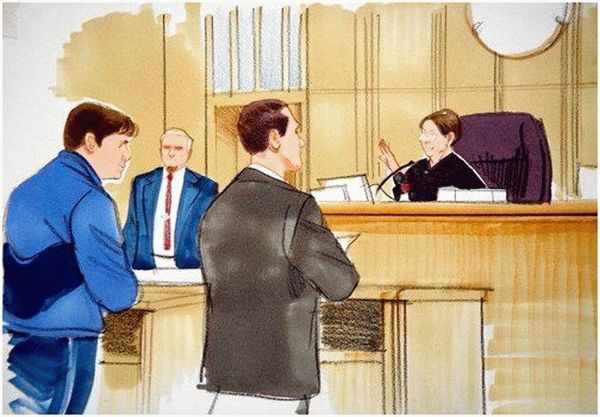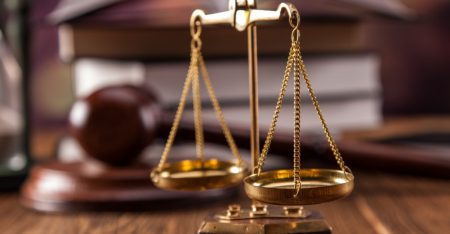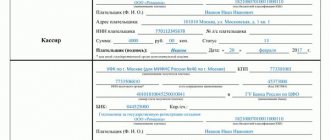Updated January 1, 2021
Hello, dear readers of the KtoNaNovenkogo.ru blog. Who is the plaintiff? Most people will answer, “It’s the one who files the claim.” And they will be partially right.
Indeed, most often plaintiffs initiate legal proceedings because they want to restore violated rights.
However, other persons can also apply to the court: a prosecutor, representatives of government bodies, parents of children.
After reading this article, you will know exactly who the plaintiff is and how he differs from the other participants in the process.
Parties to the Arbitration Proceedings: Claimant, Respondent and third parties

Within any legal relationship, the mutual rights and obligations of the opposing parties are important. In the arbitration process this becomes even more important. In this article, we will try to understand what a party to the arbitration process is, what are the rights of the parties in the Arbitration, who is the plaintiff in the arbitration court, the defendant as a participant in the arbitration process, third parties in the Arbitration, and the responsibilities of the participants in the process.
Party to the Arbitration Proceedings
Among the persons participating in the case, the parties occupy a special position:
- the plaintiff and the defendant - in claim proceedings;
- the applicant and interested parties - in cases of special proceedings and in cases of challenging decisions of the arbitration tribunal;
- debtor, creditors and interested parties - in bankruptcy cases;
- applicant and defendant - in cases of administrative and other public legal relations;
claimant and debtor - in cases of recognition and enforcement of a decision of a foreign court and a foreign arbitration award, as well as in cases of issuing a writ of execution for the forced execution of an arbitration court decision
The parties are the necessary subjects of legal proceedings, the dispute of which the court must consider and resolve. When studying the issue of arbitration court, it is worth keeping in mind many subtleties. First of all, social relations accountable to this court are strongly mixed with traditional civil relations; the only fundamental difference here is the subjects. Due to the fact that the subjects themselves change, their role in the formation of the relationships themselves also changes. Private individuals rarely appear as parties here; they have a slightly different role here.
The arbitration court primarily examines relations between legal entities, including in many cases non-profit entities, as well as individual entrepreneurs. In arbitration legal relations, this specificity is visible everywhere, which is why this independent branch was singled out as a separate one, regulating its own procedures, terms, rights, obligations, etc. Naturally, there is a huge connection with the civil procedure branch, however, many of it are inapplicable . Here we can see the special status of the parties, changed deadlines, and a special institution of the pre-trial stage of resolving problematic issues.
Considering all the specifics, it is necessary to keep in mind that there is a separate structure of arbitration courts, so if you are going to file a claim, then you need to understand that there is a certain jurisdiction. In case of violation of jurisdiction, your application may not be accepted or left without consideration.
This is interesting: Replacing an improper defendant in civil proceedings
This will ultimately result in a huge amount of wasted time. The parties to the arbitration process are the plaintiff and the defendant. The plaintiffs are organizations and citizens who filed a claim in defense of their rights and legitimate interests, the defendants are the organizations and citizens against whom the claim was brought (Article 41 of the Arbitration Procedure Code of the Russian Federation). The parties enjoy equal procedural rights.
Rights of the parties in Arbitration
Persons participating in the case have the right
- get acquainted with the case materials,
- make extracts from them, make copies;
- challenge;
- present evidence and become familiar with evidence presented by other persons participating in the case before the start of the trial;
- participate in the examination of evidence;
- ask questions to other participants in the arbitration process, submit motions, make statements, give explanations to the arbitration court, present your arguments on all issues arising during the consideration of the case;
- get acquainted with the petitions filed by other persons, object to the petitions and arguments of other persons participating in the case;
- know about complaints filed by other persons participating in the case, know about judicial acts adopted in this case and receive copies of judicial acts adopted in the form of a separate document;
- appeal court decisions;
The plaintiff does not know the defendant’s address: what to include in the statement of claim?
The information contained in the Unified State Register of Real Estate does not always contain passport data and information about the registration address of property owners. How is the issue of obtaining information about the defendant necessary to file a claim resolved in practice (Articles 131, 132 of the Code of Civil Procedure of the Russian Federation)? For example, if you need to file a negative claim against the owner of a neighboring plot of land or premises in a business center.
Answers:
Tatyana Grablina,
lawyer Land Law Firm / Commonwealth of Land Lawyers
In such cases, difficulties due to the lack of information about the defendant arise even at the stage of preparing an application for filing with the court.
Firstly, according to the law, the statement of claim must necessarily indicate information about the defendant (clause 3, part 2, article 131 of the Code of Civil Procedure of the Russian Federation):
- Full name of the citizen or name of the organization,
- the address to which future court notices will be sent.
On a note
If an organization files a claim against a citizen, it must also indicate in the application one of the identifiers:
- SNILS,
- TIN,
- passport data,
- OGRNIP,
- driver's license details, or
- vehicle registration certificate data.
If a citizen files a claim, this is not necessary.
Secondly, the plaintiff must send to the defendant and other persons participating in the case copies of the statement of claim and appendices to it (clause 6 of Article 132 of the Code of Civil Procedure of the Russian Federation).
How to find out the owner of a property?
To find out who is the owner of a neighboring land plot, building or premises in a business center, you need to order from Rosreestr an extract from the Unified State Register of Real Estate about the main characteristics and registered rights to this property. To do this, it is enough to know the address of the object.
The statement will contain information about the owner of the property:
- if the owner is a legal entity, then the extract from the Unified State Register will indicate the name of the organization and TIN. This data will be sufficient. With their help, on the tax website you will be able to obtain an extract from the Unified State Register of Legal Entities online, which will indicate all the details of the future defendant, including the address;
- if the owner of the property is an individual, then only his full name can be indicated in the extract from the Unified State Register of Real Estate.
What to do if only the owner’s full name is known?
If the defendant’s place of residence is unknown, the statement of claim can be filed with the court at the location of the property or at the address of the defendant’s last known place of residence (clause 1 of Article 29 of the Code of Civil Procedure of the Russian Federation).
A problem may arise with what place of residence to indicate in the claim and to which address to send a copy of the claim. You can solve this problem as follows.
You can send a copy of the statement of claim to the defendant individual, whose address is unknown, to the address of the property registered for him or to the address of his last known place of residence. The same address must be indicated in the statement of claim. The law also allows you to send legally significant messages addressed to a citizen at the place of his stay, as well as to the address indicated by him, for example, in the text of the contract (clause 63 of the Resolution of the Plenum of the Armed Forces of the Russian Federation dated June 23, 2015 No. 25).
Keep in mind: judicial practice does not always work out in favor of the plaintiffs - the court may dismiss an application that does not indicate the defendant’s place of residence. However, such a definition can be successfully challenged. The plaintiff’s main argument: the lack of information about the defendant’s place of residence should not be an obstacle to seeking judicial protection (Appeal Ruling of the Moscow City Court dated June 6, 2019 in case No. 33-24797/2019).
CASE STUDY
The hotel filed a lawsuit against a citizen who did not pay for his stay. Representatives of the hotel did not know either the place of residence or the place of registration of the defendant, so they indicated in the lawsuit the last known address of his place of stay - the address of the hotel itself. Attached to the statement of claim was a request for the court to assist in establishing the defendant’s registered address.
The court did not consider the petition and left the claim without movement, and then returned it, since the plaintiff was never able to find out the defendant’s place of residence.
The appeal did not agree with this position. She came to the conclusion that when preparing a case for trial, the court, at the request of the plaintiff, can request evidence that he could not obtain on his own without the help of the court (clause 2, part 1, article 149 and clause 9, part 1, article 150 of the Code of Civil Procedure RF).
Appeal ruling of the Moscow City Court dated April 10, 2020 in case No. 33-13413/2020
After the court accepts the application for proceedings, the parties can turn to it for assistance in obtaining information that the plaintiff cannot obtain on his own (Article 147 - Article 150 of the Code of Civil Procedure of the Russian Federation).
The court will make a ruling on preparing the case for trial. After this, the plaintiff can request evidence regarding the defendant's address. At this stage, the court sends an official request to the Russian Ministry of Internal Affairs.
Tags: address of the defendant Civil Procedure Code of the Russian Federation Fiscal statement negative claim shortread
Rights of the parties in Arbitration
The parties to the arbitration process participate in the dispute independently of each other, even if one of the parties is represented by several persons. In order for a person to act as a party to an arbitration dispute, he must have procedural capacity. It refers to the ability to participate in arbitration disputes in the event of a violation of rights and obligations in economic legal relations, which is endowed on all individuals and legal entities. This ability is secured at the level of federal laws and regulations, in particular the Arbitration Procedure Code of the Russian Federation. Any person whose rights have been violated can act as a plaintiff in arbitration proceedings, regardless of whether they are specified in a contract or agreement on interaction with the defendant or are enshrined as fundamental rights prescribed at the legislative level. When entering into arbitration relations, great attention should be paid to regulatory legal acts. First of all, it is worth studying the essence of your question; most often the subject of the relationship arises from the civil industry. For example, if a contractor, being an individual entrepreneur, does not fulfill the terms of the contract, then it is worth turning to this contract.
Naturally, it is worth understanding the general part of these legal relations; in this regard, there are a lot of ways for claims. Next, of course, it is worth turning to the Arbitration Procedural Code, which regulates all procedures, deadlines and mutual rights and obligations. In any case, it is important to understand the status of the subject, to study all the deadlines and procedures, otherwise it threatens, at a minimum, with problems in the legal process, and at a maximum, obtaining a court decision in favor of the opposite party.
It is important to study not only the codes themselves, but also other industry acts that may relate to the essence of these legal relations. Next, close attention should be paid to all documents that will be important for the case. These are primarily the charters of legal entities, concluded agreements and additional acts to them. It states special relationships that exist only within the framework of your legal relationship and nothing else. If the law allows additional rules to be established, then many take advantage of this when concluding an agreement. This fact is very important to keep in mind.
Ultimately, you need to not only study everything, but also correctly present it to the court, relying on the procedures of the Arbitration Procedural Code. In addition, a government organization or representatives of state and municipal authorities authorized to control in the field of economic and business legal relations can act as a plaintiff.
Third parties in Arbitration
Third parties are divided into two types:
- third parties making independent claims regarding the subject of the dispute (Article 50 of the APC);
- third parties who do not make independent claims regarding the subject of the dispute (Article 51 of the APC).
Third parties filing independent claims regarding the subject of the dispute may intervene in the case before the arbitration court of first instance makes a decision. By making independent demands regarding the subject of the dispute, they enjoy the rights and bear the responsibilities of the plaintiff, with the exception of the obligation to comply with the claim or other pre-trial procedure for resolving the dispute, if this is provided for by law for this category of disputes or by agreement (part 1, 2 of article 50 of the Arbitration Procedure Code) . When entering the process, they must pay a state fee.
A third party making independent claims enters into the arbitration process, believing that the subject of the dispute belongs to him and not to the original parties (plaintiff and defendant).
Third parties who do not make independent claims regarding the subject of the dispute may enter into the case on the side of the plaintiff or defendant before the adoption of a judicial act that ends the consideration of the case in the first instance of the arbitration court, if this judicial act may affect their rights or obligations in relation to one from the sides. They can be brought to participate in the case at the request of a party or at the initiative of the court (Part 1 of Article 51 of the APC).
Third parties who do not make independent claims are not direct participants in the disputed relationship, but have a legal connection with the plaintiff or defendant (acting on their side), as a result of which the decision in the case may subsequently affect their rights and obligations in relation to one of the parties. sides If your relationship begins to move into court or before pre-trial arbitration proceedings, then it’s time to seek legal help.
The fact is that arbitration relations are very specific; here, almost always, both parties know what they want and understand the pitfalls of their activities. In this regard, many subjects of arbitration legal relations use legal assistance. This assistance consists primarily in the correct implementation of all procedural actions. Despite the professionalism of people in introducing their industry activities, many of them do not know how to behave correctly in court, what rights they have and how it is advisable to carry out procedures. In addition, the process in the arbitration court is always expressed in a dispute, and therefore it is necessary to prove your point of view, and any argument must be supported by evidence. Therefore, problems arise in studying the issue from a legal point of view, since at the philistine level everyone understands why this is correct, but from a legal point of view no one can explain it. In addition, it is important to be able to correctly argue your point of view, as well as support your arguments with evidence. In this regard, it is still necessary to carry out a lot of actions to collect evidence that could prove your point of view on this issue.
This is interesting: Bonus for order 1010 instead of 115
It is almost impossible to do all this on your own, especially in complex categories of cases, which is why it is recommended to seek legal assistance from qualified legal specialists. Third parties who do not make independent claims regarding the subject of the dispute enjoy the procedural rights of the party and bear the procedural responsibilities of the party, with the exception of the right to change the basis or subject of the claim, change the amount of the claim, abandon the claim, admit the claim or enter into a settlement agreement, or file a counterclaim , requirement for forced execution of a judicial act (Part 2 of Article 51 of the APC).
The plaintiff continued to argue // Voluntary satisfaction of the claim, which the plaintiff does not recognize
Just recently we discussed a story where the plaintiff abandoned the claim because he considered his claims to be satisfied. The defendant argued that he did not satisfy the claims, but committed other actions that satisfied the plaintiff, which does not indicate that the latter was right in the initial dispute. Here are two posts devoted to this issue: first, second.
The other day, the Supreme Court of the Russian Federation published a ruling on another related issue: what to do when the plaintiff himself actively argues in court after the defendant voluntarily satisfied his demands? Who should bear the legal costs in this case?
The circumstances of the case considered by the RF Supreme Court can be briefly described as follows. A member of Eurocom LLC filed a claim against the company for an obligation to provide documents on the activities of the legal entity. The company sent her documents by post, but the plaintiff considered that not all documents were provided, and those that were provided were certified by an unauthorized person. Therefore, she continued to support the claims and prove that her rights as a member of society were violated. The court of first instance granted the claim, agreeing that the acting the general director, who certified the documents, was indeed not authorized to do so. The defendant brought evidence of the existence of such powers only to the appeal, which accepted them and rejected the claim. At the same time, the court collects from the plaintiff a state fee for filing a claim to the budget and a state fee for filing an appeal in favor of the society. The district court upheld the decision regarding the refusal of the claim, but canceled the decision regarding the collection of state fees.
The company filed an application to recover legal costs from the plaintiff in the amount of 85,000 rubles. This application was partially satisfied by the courts of three instances: 60,000 rubles were recovered from the plaintiff. The plaintiff filed a cassation appeal to the Supreme Court.
Let me remind you that the distribution of legal costs in case of voluntary satisfaction of the claim is directly stated in paragraph 26 of the Resolution of the Plenum of the Armed Forces of the Russian Federation dated January 21, 2006 No. 1:
If the proceedings are terminated due to the plaintiff's refusal of the claim in connection with the voluntary satisfaction of his demands by the defendant after the plaintiff goes to court, legal costs are recovered from the defendant (part 1 of article 101 of the Code of Civil Procedure of the Russian Federation, part 1 of article 113 of the Code of Arbitration Procedures of the Russian Federation, article 110 of the Arbitration Procedure Code of the Russian Federation).
It should be borne in mind that abandonment of the claim is a right, and not an obligation, of the plaintiff, therefore, reimbursement of legal costs to the plaintiff under these circumstances cannot be made dependent on his statement of abandonment of the claim. Consequently, in the event that the defendant voluntarily satisfies the claims after the plaintiff goes to court and a court decision is made in such a case, legal costs are also subject to recovery from the defendant.
It would be reasonable to assume that given such an unambiguous position, the Supreme Court of the Russian Federation accepted the case for consideration only in order to correct the obvious mistake of the lower courts. The Plenum's explanations clearly lead to the conclusion that it is inadmissible to distribute legal costs to the plaintiff. She received the requested documents only after filing a lawsuit, which means that her rights were violated and she is the winner in the dispute. However, perhaps there is something else here that we should look at in more detail.
One of the defendant’s arguments in collecting legal costs was that the plaintiff, after receiving the documents, took an active procedural position. She continued to insist that she had received an incomplete set of documents certified by an unauthorized person. The Supreme Court recognizes this argument of the defendant as untenable, but emphasizes that confirmation of the powers of the acting. the general director were presented only to the appellate court. It is clear that before they were presented, the plaintiff had every reason not to recognize the actions of the defendant as voluntary satisfaction of her demands. Therefore, there is no doubt that the judicial acts of the lower courts were canceled correctly.
But wouldn’t the situation change if the defendant brought evidence of voluntary satisfaction of the demands to the first instance, and the plaintiff continued to actively argue? The defendant, in turn, might have presented some other evidence in favor of compliance with all the requirements of the law. And as a result, the dispute about whether the rights of the participant were violated before the trial would turn into a dispute during the course of the trial about whether there was voluntary satisfaction of the demands during the proceedings. Moreover, unlike the first dispute, the winner in the second could very well be the defendant. This raises the question: why do all legal costs, regardless of the circumstances, fall entirely on the defendant?
Perhaps, when exactly such a situation arises before the Supreme Court, it will propose adding several nuances to the explanation contained in paragraph 26 of the Resolution of the Plenum of the RF Armed Forces dated January 21, 2006 No. 1.
Defendant as a participant in the Arbitration process
The defendant has the right, when considering a case in an arbitration court of any instance, to admit the claim in whole or in part.
The parties can end the case with a settlement agreement.
The arbitration court does not accept the plaintiff’s refusal of the claim, the defendant’s recognition of the claim, and does not approve a settlement agreement between the parties if this is contrary to the law or violates the rights of other persons. In these cases, the court considers the case on its merits.
Participants in the process bear procedural responsibilities provided for by federal laws or assigned to them by the arbitration court. These persons are obliged:
prove the circumstances to which they refer as the basis for their claims and objections (the obligation to prove the circumstances that served as the basis for the adoption by state bodies, local government bodies, other bodies, officials of contested acts, decisions, commission of actions or inactions is assigned to the relevant body or executive);
disclose the evidence they refer to as the basis for their claims and objections to other persons participating in the case before the start of the court hearing, unless otherwise established by the Arbitration Procedure Code of the Russian Federation;
follow the established procedure; a person who violates order in a court session or does not obey the orders of the presiding officer may, after a warning, be removed from the courtroom;
the actions of persons present in the courtroom and carrying out filming, photography, video recording, and broadcasting of the court hearing on radio and television, permitted by the court, must not interfere with order at the court hearing; these actions may be limited by the court in time. Thus, the defendant has the same broad status as the plaintiff, being a party to the Arbitration process.
Important! For all questions about the parties in the Arbitration Court, if you don’t know what to do and where to go:
Or you can in any pop-up window, so that a lawyer on your question can answer and advise you as quickly as possible.
Lawyers in arbitration and the arbitration process, and lawyers who are registered on the Russian Legal Portal , will try to help you from a practical point of view in this matter and advise you on all issues of interest.
Article 38. Parties. 1. The parties to civil proceedings are the plaintiff and the defendant.
2. The person in whose interests the case was initiated at the request of persons applying to the court for the protection of the rights, freedoms and legitimate interests of other persons, is notified by the court of the resulting process and participates in it as a plaintiff. 3. The parties enjoy equal procedural rights and bear equal procedural responsibilities. Commentary on Article 38 1. The parties to civil proceedings are the main participants in the claim proceedings. The parties are the persons participating in the case, whose dispute about the right or legitimate interest the court must consider and resolve. A plaintiff is a person in defense of whose rights and legitimate interests a civil case has been initiated. A defendant is a person who is involved by the court in a civil proceeding as a violator of the rights and legitimate interests of the plaintiff to answer the claim. Persons with civil procedural standing may act as plaintiffs or defendants. In order to actually exercise the rights of the plaintiff and defendant in court or to entrust the conduct of the case to a representative, it is necessary to have civil procedural capacity. Otherwise, these functions are performed by the legal representative. 2. In most cases, the interested parties themselves - the plaintiffs - go to court for the protection of violated rights and legitimate interests. However, in accordance with Part 2 of Art. 4 of the Code of Civil Procedure of the Russian Federation in cases provided for by this Code and other federal laws, a civil case may be initiated at the request of a person acting on his own behalf in defense of the rights, freedoms and legitimate interests of another person, an indefinite number of persons or in defense of the legitimate interests of the Russian Federation, constituent entities Russian Federation, municipalities. Thus, not only citizens and organizations, but also an indefinite circle of persons (for example, consumers), as well as public entities on behalf of which the relevant state or municipal bodies act, can act as plaintiffs. Among the persons who can act in the interests of the plaintiff, but on their own behalf, it is first necessary to highlight the prosecutor, as well as other state and municipal bodies (for example, guardianship and trusteeship authorities in the interests of children), and in cases provided for by law - individuals and legal entities (for example, consumer rights protection societies). 3. The plaintiff, in whose interests the case was initiated at the request of other persons, must be notified by the court of the time and place of the court hearing in this case. At the same time, he has the same rights and obligations as in those cases when the case would have been started at his request. However, there are exceptions to this rule. For example, the plaintiff does not pay the state fee when filing an application by other persons. 4. The prosecutor who filed the application, in accordance with Part 2 of Art. 45 of the Code of Civil Procedure of the Russian Federation enjoys all procedural rights and bears all the obligations of the plaintiff, with the exception of the right to conclude a settlement agreement and the obligation to pay court costs. If the prosecutor, on whose initiative the civil case was initiated, refuses the application filed in defense of the legitimate interests of another person, the court continues to consider the case, unless the plaintiff or his legal representative declares a waiver of the claim. 5. The parties have the same rights and bear the same obligations as other persons participating in the case (Article 35 of the Code of Civil Procedure of the Russian Federation). In addition, there are special rights that only the parties have, namely: the plaintiff changing the basis or subject of the claim, increasing or decreasing the size of the claim, abandoning the claim, the right of the defendant to admit the claim. Only the parties can end the case with a settlement agreement. The parties have equal procedural rights and obligations; none of the parties has any procedural advantage.
This is interesting: What awaits working pensioners
Requirements for the plaintiff and defendant
Capable citizens over 18 years of age have the right to submit an application to the court to resolve a dispute. Up to this age limit, their representatives according to the law (parents, including adoptive parents, trustees) act on behalf of children.
ATTENTION! A person under 18 years of age can himself exercise his rights and obligations in court from the moment of marriage if he is recognized as legally capable (emancipated).
The latter is approved by the guardianship authorities with the approval of both parents (representatives), or without it by order of the court (Article 27 of the Civil Code of the Russian Federation). Also, a child 16-18 years old is recognized as legally capable if he officially works or conducts entrepreneurial activities. In this case, the approval of the parents (adoptive parents, trustees) is required, but they are not responsible for the obligations of the emancipated relative.
Article 27 of the Civil Code of the Russian Federation
Children aged 14-18 (as well as people with partial legal capacity) are involved in legal proceedings together with their representatives according to the law. Sometimes minors have the right to defend their rights themselves (for example, in the process of compensation for damage - Article 1074 of the Civil Code of the Russian Federation). But the court can also call on representatives of the child (clause 4 of Article 37 of the Code of Civil Procedure). The rights of parents under 18 years of age are outlined in Art. 62 of the RF IC, for example, they have the right to declare paternity determination in court.
Plaintiff's liability
The plaintiff is not responsible for presenting a knowingly unfounded claim against the defendant (except for payment of compensation for loss of time). Before the court makes a decision, the rightness of the plaintiff and the defendant in any civil case is equally presumptive.
The plaintiff has the right to make any statements in court, for the inconsistency of which he is not responsible, if they do not constitute insults or slander. Indication in the statement of claim of information that was subsequently recognized by the court as untrue is not considered to be the dissemination of knowingly false information.
Plaintiff
The person in whose interests the statement of claim is filed is called the plaintiff in civil proceedings.
Along with the defendant, he is the main protagonist. It is the plaintiff who initiates an appeal to the court, determines the essence and size of his claims, and chooses ways to protect his rights. He seeks protection in court because he believes that his rights have been violated or challenged by someone.
Civil procedural legislation distinguishes between two forms of plaintiff’s participation in civil proceedings. This is a person who personally goes to court to protect his rights. Or a person in whose interests the case was initiated at the request of the prosecutor and other persons who have the right to go to court for the protection of the rights, freedoms and legally protected interests of other persons.
Who can be the plaintiff
Citizens and legal entities (commercial and non-profit organizations) can act as plaintiffs. However, only those persons who are given the opportunity by law to have procedural rights and obligations of persons participating in the case can be participants in civil proceedings.
Citizens, depending on the purpose of their participation in civil proceedings, can be plaintiffs only if they have full legal capacity. In other words, the law has restrictions for minors, incompetent or partially capable citizens on the right to independently represent their interests in court. A minor, on his own behalf, has the right to apply to the court with an application for emancipation, and a legally incompetent person - with an application for recognition as capable.
Legal entities have the right to be plaintiffs from the moment of state registration. The termination of a legal entity leads to the termination of its procedural legal capacity. The civil procedural legal capacity and capacity of legal entities is exercised by their bodies, which can be sole or collegial. All main procedural acts (applications, complaints) must come from them.
Participation in criminal proceedings
The Civil Procedure Code of the Russian Federation clearly describes the rights and obligations of a civil plaintiff. But there are instructions about such a participant in the Criminal Procedure Code. The fact is that situations are quite widespread when civil plaintiffs participate in a hearing in a criminal case. What are the reasons for this?
As stated in Article 44 of the Code of Criminal Procedure of the Russian Federation, both an individual and a legal entity have every right to be present in court during a hearing on the fact of a criminal offense, if this crime entailed material damage. In fact, a citizen/organization is admitted to the process in order to defend its own property interests.

This procedure is initiated by the victim after the criminal proceedings have begun. The civil plaintiff is obliged to declare his damages before the court makes a final decision. At the same time, no state duty is charged.
The Civil Procedure Code and the Code of Criminal Procedure of the Russian Federation stipulate the possibility of asserting one’s rights not only in the event of specific material losses. The victim can participate in criminal proceedings, even if we are talking only about moral damage. He has the right to present evidence in his favor, file motions to obtain evidence/attract witnesses, and perform other procedural actions typical of such a role.
What rights does the plaintiff have?
The plaintiff has procedural rights common to other participants in the civil process, as well as individual rights unique to him.
The plaintiff's general rights include:
- get to know the case
- make extracts from civil case materials
- make copies of case materials
- challenge a judge, court secretary, prosecutor, specialist, expert or translator
- present evidence to the court to substantiate your claims
- participate in the examination of evidence during civil proceedings
- ask questions of other persons involved in a civil case
- question witnesses
- ask questions to experts and specialists
- submit petitions
- object to the requests and arguments of other persons participating in the case
- give written and oral explanations to the court on the merits of the case
- present your arguments on all issues arising during the trial
- appeal court decisions
The individual rights of the plaintiff include the opportunity to submit the following applications:
PLAINTIFF, HIS RIGHTS AND OBLIGATIONS
Just like other persons participating in the case, the plaintiff has the right to familiarize himself with the case materials , make extracts from them, make copies - and this applies to all case materials, regardless of whether the materials are directly related to him or not.
The plaintiff has the right to file challenges , i.e., raise the issue of exclusion from participation in the case for the reasons specified in the law.
So, according to Art. 16 of the Code of Civil Procedure of the Russian Federation, a judge or magistrate does not have the right to consider a case and is subject to recusal if he:
- during the previous consideration of this case, he participated in it as a prosecutor, court secretary, representative, witness, expert, specialist, translator;
- is a relative or relative of one of the persons participating in the case or their representatives. The court hearing the case cannot include persons who are related to each other;
- is personally, directly or indirectly interested in the outcome of the case, or there are other circumstances that cast doubt on his objectivity and impartiality.
The same circumstances are the basis for the challenge of a prosecutor, a court secretary, a translator, an expert, or a specialist. An expert and specialist are also subject to recusal if they are or were in official or other dependence on any of the persons participating in the case or their representatives.
The plaintiff has the right to present evidence and participate in its examination, as well as pose questions to other persons participating in the case, witnesses, experts and specialists.
The plaintiff has the right to file petitions , including requests for evidence, both orally and in writing.
Written petitions are attached to the case file; oral arguments are entered into the minutes of the court session. These may be petitions to consider the case in the absence of the plaintiff, to postpone the trial of the case, to obtain evidence, etc.
The court can help in obtaining evidence; it is obliged to assist the parties in this. For example, the plaintiff is unable to present some evidence because this document has a certain degree of access. In , you should submit a petition indicating :
- what kind of evidence should be required;
- where is this evidence located?
- what circumstances relevant to the case can it confirm or refute;
- reasons why the plaintiff cannot present it on his own.
If the court grants this request, then the corresponding request can be sent by the court directly to the location of the evidence or handed over to the plaintiff. The person or body at whose disposal the evidence is obliged to forward it to the court independently or give it to the bearer of the request. It may turn out that the issuance or direction of evidence is impossible (not possible in principle or within the period established by the court). Then, within five days from the date of receipt of the request, the court is notified of the impossibility and its reasons.
Failure to comply with the court's requirement to present evidence for reasons recognized by the court as disrespectful against guilty officials or citizens who are not persons participating in the case is punishable by a fine for officials in the amount of up to 1,000 rubles, for citizens - up to 500 rubles.
The imposition of a fine does not relieve the relevant officials and citizens in possession of the requested evidence from the obligation to present it to the court.
Like other persons participating in the case, the plaintiff has the right to give explanations to the court orally and in writing. The plaintiff's testimony has equal importance with all other evidence; it is evaluated and considered on an equal basis with the rest. If the defendant admits the circumstances that the plaintiff refers to in support of his claims, then the plaintiff is released from the need to further prove these circumstances (Article 68 of the Code of Civil Procedure of the Russian Federation).
The plaintiff has the right to present reasonable arguments on all issues arising during the trial, and to reasonably object to the requests and arguments of other persons participating in the case.
The plaintiff has the right to appeal court decisions and use other procedural rights given to him by law. Court decisions in this case are any act issued by the court in the process (court orders, decisions, determinations, etc.). Like other persons participating in the case, the plaintiff is obliged to prove the circumstances to which he refers as the basis for his claims.
According to Art. 39 Code of Civil Procedure of the Russian Federation, only the plaintiff has the right :
- change the basis or subject of the claim;
- increase or decrease the amount of claims;
- abandon the claim and enter into a settlement agreement.
As we remember, the subject of the claim is what and what the plaintiff asks for, the basis of the claim is the circumstances on which these demands are based, and the evidence confirming these circumstances.
The plaintiff has the right to change either the basis or the subject of the claim (because if both the subject and the basis are changed, then it will be a completely different claim).
The plaintiff has the right to increase or decrease the claims.
A request to reduce or increase claims is made orally or in writing and addressed to the court. A decision to increase the claims may be made if, for example, after filing the statement of claim, the plaintiff finds out that the damage caused to him is much greater than that indicated in the statement of claim. Reducing claims is quite rare, but also possible (when it comes to understanding that less is better than nothing).
If the basis or subject of the claim changes, as well as if the size of the claim increases or decreases, the period for consideration of the case begins from the day the corresponding procedural action was performed (clause 3 of Article 39 of the Code of Civil Procedure of the Russian Federation).
Only the plaintiff has the right to withdraw the claim in whole or in part, orally or in writing.
In case of complete refusal, the trial is terminated and a ruling is made.
If the claim is partially abandoned, the process continues and the dispute is resolved in terms of those claims that the plaintiff did not waive.
The consequences of refusing a claim are:
- it becomes impossible to re-file the same claims;
- court costs are not reimbursed by the defendant;
- the plaintiff must compensate the defendant for the costs incurred by him in connection with the conduct of the case (Article 101 of the Code of Civil Procedure of the Russian Federation), if the refusal of the claim did not occur due to the voluntary satisfaction of the claims by the defendant after filing the claim. In this case, you should file a petition for reimbursement of all legal costs incurred in the case (without this, the costs are unlikely to be reimbursed).
Similar consequences occur when the parties enter into a settlement agreement. A settlement agreement can be concluded at any stage of the process, including when reviewing a court decision. The court or judge will constantly ask whether the parties are willing to enter into a settlement agreement. The meaning of the settlement agreement is that each party renounces a certain share of its claims. The right to conclude a settlement agreement is not an absolute right.
The court does not have the right to accept the plaintiff’s refusal of the claim and approve the settlement agreement if it contradicts the law or violates the rights and legitimate interests of other persons.
Another exclusive right of the plaintiff : to ask the court to replace the improper defendant with the proper one (Article 41 of the Code of Civil Procedure of the Russian Federation).
The plaintiff, his rights and obligations ! Write a few words about this in the comments and share this information on social networks with your friends. And in order not to miss other important changes in new laws in the future, subscribe to receive news.
RAA Law






